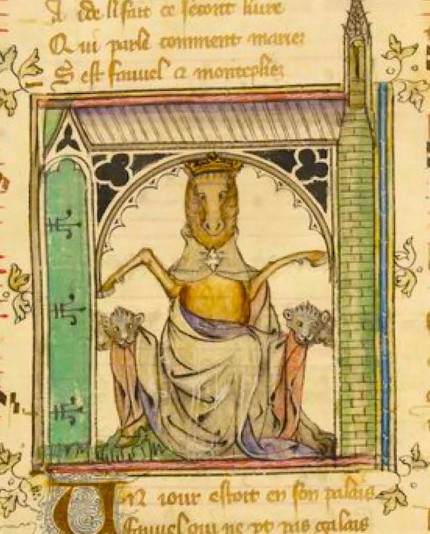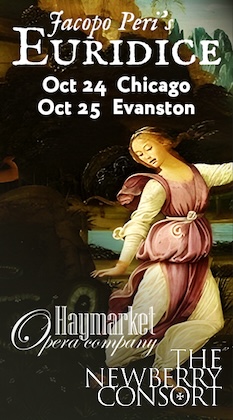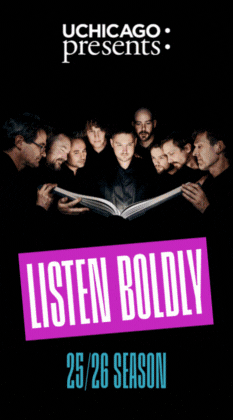Newberry Consort brings scholarship and horse sense to delightful “Le roman de Fauvel”
The Newberry Consort brought the medieval Le Roman de Fauvel (“The Tale of Fauvel”) to life in a stellar production at the Logan Center for the Arts on Saturday night. The evening’s fourteenth-century romp was a showcase of rarified musicianship, meticulous scholarship, and humor running the gamut from genteel to obscene.
Le Roman de Fauvel, something of a morality play, has come down to us in a fourteenth-century manuscript housed at the Bibliothèque nationale de France. The title character is a horse, whose name is an acronym of the vices he embodies—flattery, avarice, variety, vanity, envy, and cowardice (lâcheté in French). Fauvel achieves an undefined position of power through the graces of Lady Fortune, and rules over a society of morally bankrupt sycophants. When Fauvel attempts to consolidate his ascendancy through marriage to Lady Fortune, she pawns him off on Lady Vainglory, and those two produce a brood of hapless offspring that disperse across France—a cautionary tale about the union of too many vices.
The occasion for the work’s performance was the medieval January Feast of Fools, essentially a protracted carnivalesque affair where social order is playfully turned on its head. At Saturday’s concert, after the performers marched on stage playing an estampie (a medieval instrumental dance), a male vocal sextet comprised of Rookery Choir members launched the performance with a conductus (a medieval song form) invoking the festival.
The evening’s singing was of the highest order across the board. In their various numbers the Rookery singers had a luminous quality, with assiduous balance, spot-on intonation, and obvious fluency in medieval musical idioms. Bass Joseph Hubbard was particularly effective in his personifications of the buffoonish Fauvel, and narrative poetic readings were delivered in convincing medieval French.
Newberry co-director and soprano Ellen Hargis made numerous solo contributions that were both evocative and thoughtful. Debra Nagy, whose playing on shawm, harp, and percussion highlighted the sophisticated Consort, periodically joined Hargis in vocal duets of moving limpidity.
The entire production was Nagy’s brainchild. She judiciously excerpted the original Fauvel manuscript to create a well-paced and intelligible narrative. She also arranged much of the music, which Hargis and Newberry founding member David Douglass helped adapt for the Consort’s forces. Nagy’s feats are astonishing when one considers the distance between a medieval manuscript sitting in a French library and Saturday’s vital, relevant performance.
Another impressive feature of the production was the visually enhanced translations that accompanied it, curated by Shawn Keener. Frequently such adornments can be distracting or gimmicky, but Keener’s beautiful and highly amusing selection of illuminated manuscripts depicting the donkey-ruler added greatly to the performance and further transported the audience back in time.
Speaking of temporal shifts, a takeaway from Newberry’s Fauvel was that certain kinds of humor transcend time and place. This was most apparent in the ways prominent people were described ingratiating themselves with Fauvel, with endless innuendoes about “stroking” him and giving him a “rub down.” For anyone who missed the point, it was driven home by a double-entendre about prominent people’s willingness to “kiss ass” to get ahead. While such bawdiness might seem juvenile, Newberry’s performance betrayed so much attention to detail and scholarly rigor one could rest assured it was an authentic rendering of fourteenth-century wit.
The Newberry Consort’s Le Roman de Fauvel will be repeated 3 p.m. Sunday at the Alice Millar Chapel in Evanston. The Consort’s next performances are April 8-10 and feature the Juan de Lienas Vespers.http://newberryconsort.org/
Posted in Uncategorized




